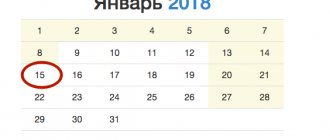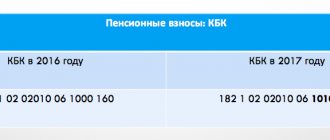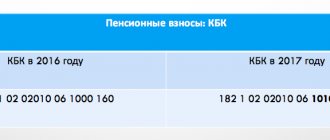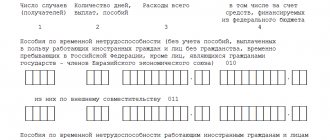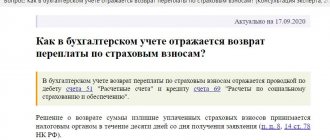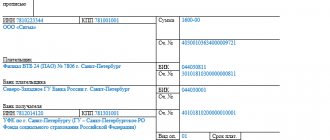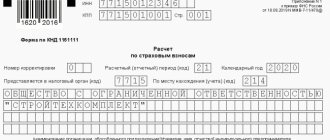From January 1, 2021, the Tax Code has been supplemented with a new chapter 34 “Insurance premiums”. The chapter includes articles 419–432, regulating the rules for calculating and paying contributions to the funds. From 2021, the basic principles regarding taxes also apply to contributions. This is provided for by Federal Law No. 243-FZ of July 3, 2021. Starting from the new year, pension, medical and contributions in case of disability and in connection with maternity (except for contributions for injuries) are part of the tax legislation, which means that the administration of these payments and the acceptance of reports on them from 2021 will also become the function of tax authorities. The funds will maintain personalized records of insured persons. The Pension Fund will remain in charge of the assignment and payment of pensions. That is, tax officials will control the accuracy of data on earnings, and employees of the Pension Fund of the Russian Federation will control the accuracy of information about work experience.
Elena Silchenko, payroll accountant, Kirovsk, says: “To be honest, the latest innovations in the field of contributions are not so critical. Literally every year, and sometimes more often, Russian legislators radically change something in taxation and accounting. We accountants are almost used to this, but usually the changes are minor and it is quite difficult to track them all. Here, the Ministry of Finance released all the innovations in a single block, thereby relieving accountants of the need to constantly monitor amendments to the Tax Code, PBU and other regulations.”
How to report to the Pension Fund
Companies will submit two calculations to the Pension Fund of Russia: form SZV-M (monthly information about insured persons), as well as a new report on the length of service of each employee of the company, on whose remuneration insurance premiums are calculated. The SZV-M form will remain. Companies and individual entrepreneurs will have to submit it in the same order as now. Only the deadlines for submitting information will shift. In 2021, the SZV-M report had to be submitted to the Pension Fund no later than the 10th day of the month following the reporting month. In 2021, the SZV-M report will need to be submitted to the Pension Fund of Russia units on time, no later than the 15th day of the month following the reporting month. That is, there will be five days more time to fill out reports (new edition of clause 2.2 of Article 11 of the Federal Law of April 1, 1996 No. 27-FZ). For example, the SZV-M report for January 2021 will need to be submitted no later than February 15. If you do not submit the SZV-M on time or distort the information in it, the company will be fined - 500 rubles for each employee in the report.
Form SZV-K “Information on the work experience of the insured person for the period before registration in the compulsory pension insurance system” was approved by Resolution of the Board of the Pension Fund of the Russian Federation dated July 31, 2006 No. 192p. The deadline for filing the SZV-K is established by the territorial branch of the Pension Fund of Russia in its written request. Typically this is four weeks from the date of receipt of the request letter. Officially, the timing of SZV-K has not been established anywhere.
The SZV-K form includes information about:
- labor activity (place and period of work);
- other periods that are counted towards retirement (sick leave, parental leave for up to 1.5 years);
- territorial and special conditions giving the right to early retirement;
- work experience;
- length of service;
- professions and positions.
note
Over the past couple of years, extra-budgetary funds have begun to master the methods of their tax colleagues when conducting audits, but it is the audits of insurance premiums that will reach a new level from 2021 and will be carried out more often and more strictly.
If you do not submit the SZV-K form or make an inaccuracy in it, there are no penalties. But if the organization does not submit or distorts information about the length of service, and the pension turns out to be too high, Pension Fund officials can go to court with a claim for compensation for material damage. Starting from 2021, policyholders will submit to the Pension Fund information about the length of service of each person working for them. The report will be annual. The form must be submitted to the fund no later than March 1 of the year following the reporting year. The specified annual report for 25 people or more will need to be submitted to the Pension Fund in electronic form via telecommunication channels. Information for a smaller number of insured persons can be submitted in paper form.
Unified social insurance tax 2021. Structure and features
- The tax authorities regulate payments starting from 2021. But the funds still have small responsible areas. The Social Insurance Fund is now responsible for payments for traumatic situations. The Pension Fund deals with reports in two forms: C3B-experience and C3B-M.
- Contributions are also paid by citizens related to the sphere of entrepreneurs - legal entities, “investors”, patent holders.
- Tax is imposed on income from work for individual entrepreneurs and lawyers. And legal entities have payments to their employees under contracts.
- The rate has not changed and in general is still the same 30%.
- Reporting is now done in a new way. It is necessary to make calculations according to ESSS
- Contributions for individual entrepreneurs are calculated depending on the level of the minimum wage. The excess limit (300 thousand) is subject to interest.
- You can report using standard paper methods. But there are limitations. For companies with more than twenty-five employees, reporting is provided only in electronic form.
- Payment of the ESSS will take place using new details (federal tax service).
- Payment times and maximum terms also remain the same. For ESSC companies, payments are made until the 15th of the reporting month.
- For individual entrepreneurs, the fixed amount they pay must be transferred by the end of the year, unless the amount exceeds the limit. Everything that is exceeded is until April 1 of the next year.
- Fines for violations of deadlines are formed by the Federal Tax Service (including blocking of accounts). A fine of 200 rubles per day is imposed for each report not submitted. Moreover, funds in the areas in which they remained responsible also have the right to impose certain sanctions.
What will be the reporting to the Social Insurance Fund?
You will only have to report to the Social Insurance Fund for contributions “for injuries.” Calculation form 4 - FSS approved by order of the Federal Tax Service of Russia dated October 10, 2021 No. ММВ-7-11/551. Everything “unnecessary” that does not apply to contributions “for injuries” was excluded from it. The deadlines for submitting calculations to the FSS in 2021 will remain the same as for submitting 4 – FSS in 2021. Thus, the calculation must be submitted electronically no later than the 25th day of the month following the reporting month. If the reporting is presented “on paper”, then it must be submitted no later than the 20th day of the month following the reporting one.
Read also “Errors when filling out Form 4 FSS”
Please note that policyholders with an average number of more than 25 people in 2021 will be required to report electronically, while all others will be able to submit reports to the Social Insurance Fund on paper. At the same time, as you can see, the method of submitting settlements to the Social Insurance Fund in 2021, as before, will affect the acceptable deadlines for submission.
Bottom line
There was no drastic change in 2021. However, even some small changes attract attention, because the correctness of reporting depends on them. The main thing is that the FSN is now taking over the administration of contributions. And the main technical point was the new details for transferring contributions. All this is important to know and remember. And prepare for subsequent innovations, which most likely will not take long to arrive.
You may also be interested in the material: “VAT is for dummies. What is it in simple words?
Responsibility for non-payment of insurance premiums
Previously, with regard to the payment and calculation of insurance premiums, the payer was not subject to the provisions of the Tax Code - in particular, there was no separate liability for violation of accounting rules. However, now, since the administration of insurance premiums will be transferred to the tax authorities, liability will be extended for gross violation of accounting rules, which resulted in an understatement of the base for insurance premiums (clause 3 of Article 120 of the Tax Code of the Russian Federation). In addition, liability for failure to submit documents during tax control will be extended - in the amount of 200 rubles for each document not submitted. Responsibility for personalized accounting is also established. Thus, for non-compliance by the policyholder in the prescribed cases with the procedure for submitting personalized accounting information in the form of an electronic document, a fine of 1000 rubles is provided (Article 17 of the Federal Law of April 1, 1996 No. 27-FZ).
Additional sanctions certainly have a negative effect on contribution payers. At the same time, there is also a positive aspect: a three-year statute of limitations has been introduced for bringing to justice for committing an offense in the field of personalized accounting. This means that beyond the three-year period the company cannot be held liable. All other reporting, except for the above, must be sent to the Federal Tax Service. Instead of the familiar calculations of RSV-1 and 4 - FSS, tax authorities have already approved a new unified form for quarterly calculation of contributions. It replaces several familiar forms at once: RSV-1, RSV-2, RV-3 and 4 - FSS.
Evgeniy Simonov, head of the personnel service, St. Petersburg, says: “I would like the Ministry of Finance to try to control itself and not issue new rules and report formats every month. When accepting subsequent amendments, officials must be sure that new adjustments will not be required. Why is there a constant need to redo regulations and the Tax Code? Sometimes it seems that this is being done deliberately in order to completely confuse accountants and personnel officers.”
Read also “Responsibility for violations of payment of insurance premiums 2017”
Insurance premium rates for employees in 2019
In 2021, insurance premiums must be paid at the following rates:
- For pension insurance (PPI) – 22%
. - For health insurance (CHI) – 5,1%
. - For social insurance (OSS) - 2.9%
(excluding
accident
).
At the same time, some individual entrepreneurs and organizations have the right to apply reduced tariffs
(see table below).
In 2021, the limits for calculating contributions have changed:
- for OPS – 1,150,000
.
(in case of excess, contributions are paid at a reduced rate - 10%
); - for OSS – 865,000
rubles. (if exceeded, contributions are no longer paid); - for compulsory medical insurance – the limit has been abolished.
note
that in 2021, benefits on insurance premiums were canceled for most individual entrepreneurs and organizations. In particular, this affected individual entrepreneurs with a patent, as well as representatives of SMEs working in the social and industrial spheres and using the simplified tax system. Reduced tariffs were left only for NGOs and charitable organizations. More details on insurance premium rates can be found in the table below.
General rates for insurance premiums in 2021
| Payer category | OPS | Compulsory medical insurance | OSS | Total |
| Organizations and individual entrepreneurs on OSN, simplified tax system, UTII, PSN and Unified Agricultural Tax, with the exception of beneficiaries | 22% | 5,1% | 2,9% | 30% |
| If the limit of 865,000 rubles | 22% | 5,1% | — | 27,1% |
| If the limit of 1,150,000 rubles | 10% | 5,1% | — | 15,1% |
Reduced rates for insurance premiums in 2021
| Payer category | Pension Fund | FFOMS | FSS | Total |
| NPOs on the simplified tax system, conducting activities in the field of social services. services, science, education, healthcare, sports, culture and art | 20% | — | — | 20% |
| Charitable organizations on the simplified tax system | ||||
| Participants of the free economic zone in Crimea and Sevastopol | 6% | 0,1% | 1,5% | 7,6% |
| Organizations and individual entrepreneurs engaged in technical innovation and tourism and recreational activities in special economic zones | 20% | 5,1% | 2,9% | 28% |
| Business companies and partnerships operating in the field of IT technologies and meeting the conditions of paragraphs 1 and 2 of Art. 427 Tax Code of the Russian Federation | ||||
| Organizations that have received the status of a participant in the Skolkovo project | 14% | — | — | 14% |
| Organizations and individual entrepreneurs making payments to crew members of ships registered in the Russian International Register of Ships | — | — | — | 0% |
| Organizations in the field of IT (provided that the income from this activity at the end of 9 months is at least 90%, and the number of employees is at least 7 people | 8% | 4% | 2% | 14% |
Note
: benefit recipients, in case of exceeding the limits of 1,150,000 and 865,000 rubles. There is no need to make social and pension insurance contributions.
Additional rates for insurance premiums in 2021
| Payer category | Pension Fund | FFOMS | FSS | Total |
| Payers specified in paragraphs. 1 clause 1 art. 419 of Law No. 400-FZ in relation to payments to individuals named in paragraph 1 of paragraph 1 of Art. 30 of this law | 9% | — | — | 9% |
| Payers specified in paragraphs. 1 clause 1 art. 419 of Law No. 400-FZ in relation to payments to individuals named in paragraphs 2-18 of paragraph 1 of Art. 30 of this law | 6% | — | — | 6% |
Note
: additional contributions are paid regardless of the limits of 1,150,000 and 865,000. Moreover, companies that have assessed working conditions can pay additional fees. contributions to pension insurance at special rates (clause 3 of Article 428 of the Tax Code of the Russian Federation).
Single calculation
Policyholders are required to submit a single calculation of insurance premiums to the Federal Tax Service no later than the 30th day of the month following the billing or reporting period (clause 7 of Article 431 of the Tax Code of the Russian Federation). Accordingly, for the first time, a single calculation will need to be submitted based on the results of the first quarter of 2021. A new calculation of insurance premiums must be submitted for the first time no later than May 2, 2021. Companies and merchants with an average number of employees of more than 25 people are required to submit payments in electronic form via telecommunications channels. All other payers of contributions will be able to report “on paper” (clause 10 of Article 431 of the Tax Code of the Russian Federation). Please keep in mind that the method of submitting reports on insurance premiums from 2017 to the tax office does not in any way affect the deadlines for submission.
Deadlines for regulatory authorities to apply for arrears
If we consider the fact of underpayment of contributions, then the permissible limitation period for them is determined by summing the periods of all collection measures. Thus, from 2021, the procedure for calculating the limitation period in the field of payments to the pension fund, medical and social insurance fund is regulated by the provisions of Art. 46 Tax Code of the Russian Federation. In particular, if the amount of contributions is not fully repaid, the Federal Tax Service issues a demand to the payer. By default, 8 days are allotted for its completion, unless a different period is specified in it.
Ignoring the requirement and failure to repay the debt during this period leads to forced collection of the debt. Initially, an order for forced withdrawal of funds is sent to a credit institution. It is issued at the end of the period allotted for covering the debt, and no later than 2 months from that day. If 2 months have already expired, debts can only be collected by court decision. To appeal to the judicial authorities, the Federal Tax Service has 6 months from the date of expiration of the period established in the requirement. If it is missed due to objective, extenuating circumstances, then its restoration is allowed.
IT SHOULD BE NOTED! It is possible that the account balances will not be enough to cover the resulting debt, then foreclosure on the debtor’s property is possible.
The last decision is made by the head of the Federal Tax Service or his deputy and transferred to the bailiff. The Federal Tax Service has 12 months for this. At the end of this period, such a decision can only be made by a court, which can be addressed on such an issue within 2 years from the end of the deadline for paying the arrears.
Taxable objects for insurance premiums
Taxable objects for insurance premiums in 2021, as before, will be considered payments and other remuneration in favor of individuals accrued under employment and civil contracts (Article 420 of the Tax Code of the Russian Federation). The list of payments that may not be subject to contributions will also remain. This list is given in Article 422 of the Tax Code of the Russian Federation. The only change will affect the daily allowance. In 2016, the entire amount of daily allowance specified in the collective agreement or in a local regulation was exempt from contributions. From January 2017 the situation will change. It will be possible not to pay contributions only for an amount of no more than 700 rubles for business trips within Russia, and for an amount of no more than 2,500 rubles for business trips abroad. This is enshrined in paragraph 2 of Article 422 of the Tax Code of the Russian Federation. That is, from 2021, the same limits apply to daily allowances as for personal income tax (clause 3 of Article 217 of the Tax Code of the Russian Federation). With regard to contributions “for injuries” everything will remain the same. Per diems will be fully waived from these contributions in 2021.
Read also “Limits and base for insurance premiums for 2021”
Deadlines for payment of insurance premiums for individual entrepreneurs
All entrepreneurs, both those using the labor of employees and those working alone, are required to transfer insurance premiums for compulsory health insurance and compulsory medical insurance in a fixed amount. These are individual entrepreneur’s contributions “for himself”, which he pays in addition to contributions for employees, if he has any.
Individual entrepreneur contributions are calculated from the minimum wage current as of January 1 of the reporting year, and are not affected by the tax regime under which the entrepreneur operates. In 2016, individual entrepreneurs pay 23,153.33 rubles for themselves, of which:
- RUB 19,356.48 – pension contribution,
- RUB 3,796.85 – health insurance contribution.
The deadline for paying contributions to the Pension Fund is the last day of the year for which they were accrued, i.e. December 31st, and they can be paid throughout the year. This can be a one-time payment for the entire amount at once, or payment in equal installments once a quarter, month, or in some other way, as the entrepreneur himself sees fit. There is good news for forgetful individual entrepreneurs - since December 31 this year coincided with Saturday, the last day for paying fixed amounts for 2021 is moving to January 9, 2021. But be careful: from January 1, 2017, insurance payments no longer need to be made to the funds, but to the tax office, accordingly, according to the new BCC and details.
Insurance premiums for 2021 will be calculated from the minimum wage in force as of 01/01/2017. This amount is equal to 7,500 rubles, and the amount of the annual fixed contribution will be 27,990.00 rubles, of which:
- RUB 23,400.00 - pension contributions,
- 4590.00 rub. – deductions for compulsory medical insurance.
The last day for transferring fixed contributions for 2021 will also be moved to the first post-holiday working day of 2021, since December 31 in 2021 is a Sunday.
For individual entrepreneurs who received more than 300,000 rubles in income per year, in addition to the fixed pension contribution, you need to pay an additional 1% contribution. It is accrued only on income exceeding 300,000 rubles. The deadline for paying the additional contribution to the Pension Fund is April 1 of the following year. This day coincides with a Saturday in 2021, so the deadline for payment of the 2021 contribution has been moved to April 3, 2021.
If an entrepreneur decides to stop his business in 2021, then the deadline for transferring insurance premiums “for himself,” as well as the previous deadline for paying insurance premiums to the Pension Fund of the Russian Federation, will be 15 calendar days from the date of deregistration as a payer (clause 5 of Article 432 Tax Code of the Russian Federation).
An individual entrepreneur can send fixed contributions to the budget by payment orders from a current account, and in the absence of one, pay contributions in cash using a receipt in the form No. “PD-4sb tax”. If an entrepreneur has earned no more than 300,000 rubles, he will have to fill out two payment documents; if the income limit is exceeded, there will be three payment orders or receipts. This is due to the fact that for each type of contribution, its own BCC is indicated.
New KBK
Insurance premiums until 2021 had to be transferred in separate payment orders to each extra-budgetary fund: Pension Fund, Federal Compulsory Medical Insurance Fund and Social Insurance Fund (Part 4 of Article 16 of the Federal Law of July 24, 2009 No. 212-FZ). Since 2017, the Federal Tax Service has become the administrator of pension, medical and contributions in case of disability and in connection with maternity (except for contributions for injuries).
Therefore, for payments for January 2021, payment orders must indicate the Federal Tax Service as the recipient. In this regard, new budget classification codes (BCC) for payment of contributions should be approved (Article 6 of the Budget Code of the Russian Federation, Clause 1 of Article 30 of the Tax Code of the Russian Federation). Since the FSS of the Russian Federation remains the administrator for contributions “for injuries”, payment orders must be sent to the Fund to the appropriate BCC (clause 1.1 of Article 22 of Law No. 125-FZ). The BCC for these contributions should not change from 2021.
Read also “KBK 2021. Be careful”
In addition, be careful, if in the calculation of insurance premiums the data on the total amount for pension insurance does not coincide with the amount of contributions accrued for each individual, the calculation will be considered unsubmitted. And the tax authorities will have to send a notification to the policyholder about the identified discrepancy between the indicators. Within five days from the date of receipt, the policyholder is obliged to submit an adjusted calculation. In this case, the date of its submission will be the date of the initial submission of reports (clause 7 of Article 431 of the Tax Code of the Russian Federation).
The procedure for collecting arrears of contributions from accidents
The collection of debts on contributions for accidents and occupational diseases will continue to be handled by the FSS on the basis of Law No. 125-FZ. It defines the mechanism for repaying arrears using monetary resources or property of the payer. If the fact of non-payment is revealed, the FSS is given 3 months from the date of discovery to issue a corresponding demand. If such a fact is revealed during the inspection, then 10 days from the date of its completion. The payer of contributions is obliged to fulfill the received demand within 10 days from the date of its delivery. If he does not do this, the FSS has 2 months to enforce collection through a bank or bailiff.
The maximum period for holding the payer liable for violations on the basis of clause 1 of Art. 26.27 of Law No. 125-FZ - also 3 years. They are calculated from the day the violation was committed or the day following the period of its commission.
Reasons for the changes?
“Raschet” asked Pavel Kurlat, partner of the First Legal Network, to answer the question: why does the state need changes in the procedure for collecting and monitoring insurance premiums? Is the main goal to increase fundraising?
“This change has been discussed for a long time. It is expected that the adoption of new amendments to legislation will reduce the administrative burden on business by reducing the number of regulatory bodies, reducing unnecessary bureaucracy and optimizing reporting. How this will look in practice, only time will tell.
note
Taking into account how poorly our interdepartmental exchange of information is, at the beginning of 2021, there will most likely be problems in the relationship between funds, tax authorities and payers in the transfer of data on the amount of insurance premiums, their payment and all related mutual settlements.
I believe that the change in the procedure for collecting insurance premiums in 2017 serves several purposes. But first things first. I think that the reform is dictated by the need to increase the state’s collection of funds for social insurance. Apparently, funds are not able to cope with such a task on their own. In general, it should be noted that despite the reform, the amount of taxes paid will not change. As employers paid insurance premiums, so they will pay – both LLCs and individual entrepreneurs. Only now almost all payments will be made to the Federal Tax Service at the place of registration of the business.”
Read also “How to pay insurance premiums correctly and report in 2017”
Why did the former UST and current insurance premiums never turn into the ESS?
If only because the Tax Code of the Russian Federation understands something completely different by collection, namely, a mandatory contribution from organizations and individuals for the performance of legally significant actions by state bodies, local governments, other authorized bodies and officials. The state duty is a fee, but insurance premiums are not at all similar to it for their intended purpose.
But the point here is that if this payment were a fee, almost all the provisions of Part 1 of the Tax Code of the Russian Federation would apply to it. However, as it turned out, this turned out to be neither profitable nor convenient for the initiator of the changes – the Government.
And now it is written in paragraph 3 of Art. 1 of the Tax Code of the Russian Federation that the Code applies to relations regarding the establishment, introduction and collection of insurance premiums only in cases where this is directly provided for by the Code (see the wording of this article, effective from 01.01.2017).
For example, you know that according to paragraph 1 of Art. 78 of the Tax Code of the Russian Federation, the offset of amounts of overpaid federal taxes and fees, local and regional taxes is carried out for the corresponding types of taxes and fees, as well as for penalties accrued on the corresponding taxes and fees.
If contributions became a type of fee (ESS), they would be classified as federal fees and it would be possible to ask for the overpayment of contributions to be offset, for example, against arrears of VAT or vice versa. But such an opportunity will not arise. The Tax Code of the Russian Federation does not classify insurance premiums as types of taxes and fees - neither federal, nor regional, nor local. Read the article. 12 of the Tax Code of the Russian Federation. It classifies taxes and fees, but does not apply to contributions. In Art. 18.1 of the Tax Code of the Russian Federation it is noted that insurance premiums are federal, but not fees or taxes, but a separate type of payment. And that is why in paragraph 1.1 of Art. 78 of the Tax Code of the Russian Federation stipulates that the amount of overpaid insurance premiums is subject to offset only against the corresponding budget of the state extra-budgetary fund of the Russian Federation, to which this amount was credited, against the payer's upcoming payments for this contribution, debt for the corresponding penalties and fines for tax offenses or return to the payer .
So the confusion with the names did not just happen and it was not without reason that they left us with the name “Insurance Premiums”.
Conceptual approach
“Another thing is that the tax service has much more opportunities and practical experience in how to most effectively collect debts,” continues Pavel Kurlat. “I think in this case the total number of collected fees will only increase. In addition, this corresponds to the conceptual approach to reforming the financial management system in our state. In the recent past, several supervisory authorities in the field of control were liquidated with the transfer of functions to the mega-regulator - the Central Bank of the Russian Federation. The situation is the same here - the transfer of several similar functions from several entities to a single “tax agent”. This, ultimately, should provide greater opportunities for the government to mobilely accumulate and operate public finances, simplifying the procedure and guaranteeing higher efficiency in the collection of taxes and mandatory payments. Moreover, there is an obvious tendency towards tightening tax discipline for all categories of payers in the context of a shrinking tax field.”
Read also: “Mistakes by tax agents”
Possible problems
Studying the text of the law gives the impression that funds and the tax office will be forced to exchange a large amount of information with each other. However, given how poorly our interdepartmental exchange of information is, at the beginning of 2021, there will most likely arise possible problems in the relationship between funds, tax authorities and payers in the transfer of data on the amount of contributions, their payment and all related mutual settlements. In this regard, it can be predicted that the workload on the courts will increase in connection with taxpayers challenging the actions of the tax service. “It seems to me that some confusion in payments at the beginning of the year is inevitable. Not all entrepreneurs in our country follow changes in legislation so closely. Much will depend on the actions of the funds themselves and the tax service, which need to be given more complete advice on the procedure for paying insurance premiums,” sums up Pavel Kurlat.
What awaits entrepreneurs
At the request of “Raschet”, Yulia Rybalko, a leading specialist in legal payroll calculations, told us what to expect for companies and entrepreneurs after the adopted changes, how the inspection procedure will change and how much the amounts of additional charges can increase?
“As for the procedure for checking accruals, the reports provided for the year 2021 inclusive will be checked by extra-budgetary funds for the correctness and correctness of the calculations. Starting from the results of the first quarter of 2021, the reporting will be checked by the tax authorities.
In my assessment, companies should expect an increase in desk audits from the Social Insurance Fund related to reimbursement of employer expenses paid for sick leave. The increase in inspections will be due to the fact that tax authorities will transmit information on declared expenses in quarterly reports to the territorial body of the Social Insurance Fund. I believe that insurance costs will be checked through desk or even on-site audits.”
Read also “Desk and field tax audits”
What is payroll tax made of?
Citizens' income received in the form of wages is subject to several types of taxes:
- on the income of individuals (personal income tax);
- insurance premiums;
- other fees intended to be directed to extra-budgetary funds.
The responsibility to calculate tax liabilities lies with the employer. It is he who is responsible for the correct calculations and transfers of tax payments for each employee within the period regulated by law.
Change of department
The process of transferring taxpayer cases from the Pension Fund of the Russian Federation and the Social Insurance Fund to the tax authorities’ databases began in October 2021, but has not yet been completed.
“In this regard, I believe there is a possibility that taxpayers will be faced with insufficient data from the Federal Tax Service regarding the availability of submitted reports and the amounts of previously paid insurance premiums,” says Yulia Rybalko, “In order to avoid further proceedings on this issue not only with extra-budgetary funds, but and with fiscal authorities, I recommend that companies make a reconciliation with extra-budgetary funds by the end of 2021. Since reporting will be provided directly to tax authorities in 2021, the rules established by fiscal legislation will apply to them when conducting audits. In turn, the Social Insurance Fund will retain the obligation to carry out checks regarding compulsory insurance costs.
In this regard, companies should take into account that the same tax period can be checked twice - both by the Service and by the Social Insurance Fund. The Pension Fund of Russia will retain the obligation to verify only in relation to personalized accounting, i.e. verification will remain only in relation to the information that companies indicate monthly in the SZV-M form.
To date, the mechanism for inspections by the Federal Tax Service has been developed and well established. As practice shows, it does not fail, and therefore the number of detected inconsistencies, inaccuracies, and errors in reports provided by taxpayers will be significantly higher than it was during audits by extra-budgetary funds.
Read also “Federal Tax Inspections: a new approach”
To be fair, it is worth noting that over the past couple of years, extra-budgetary funds have begun to master the methods of their tax colleagues when conducting audits, however, starting from 2017, insurance premium audits will reach a new level and will be carried out more often and more strictly.”
Procedure for paying taxes on wages
All income received by employees is subject to taxation. Only the following are exempt:
- benefits for pregnancy, childbirth and child care;
- interest on mortgage payments;
- payment for education.
The Tax Code of the Russian Federation describes in detail the rules for withholding taxes from salaries. Any organization must strictly comply with the conditions described in the code. In addition, it is impossible to violate the established deadlines for submitting such an important reporting document as a tax return to regulatory authorities.
Entrepreneurs who adhere to the simplified tax system are subject to general rules. Individual entrepreneurs (IP) also need to pay taxes on salaries. In addition, you should make insurance contributions - both for the hired personnel and for the individual entrepreneur himself. In this case, the calculation is made in a special way, based on the current minimum wage.
| Name of the extra-budgetary fund | Interest rate | The legislative framework |
| PFR (Pension Fund of Russia) | 22.00% (of accrued wages, which for the year does not exceed 796,000 rubles); 10.00% (of accrued wages that exceed 796,000 rubles for the year); 16.00% (for agricultural producers); 26.00% (for individual entrepreneurs who do not use hired workers who pay for themselves) | Article 58.2 of Federal Law No. 212 of July 24, 2009 |
| FSS (Social Insurance Fund of the Russian Federation) | 2.90%; 1.90% (for business entities using the Unified Agricultural Tax regime) | Article 58 of Federal Law No. 212 of July 24, 2009. |
| FFOMS (Compulsory Health Insurance Fund) | 5.10%; 2.30% (for agricultural producers) | Article 58 of Federal Law No. 212 of July 24, 2009. |
| Additional tariffs established for payments to individuals who are employed in underground or work with difficult or harmful working conditions, in hot shops | 9,00% | Article 58.3 of Federal Law No. 212 of July 27, 2009. |
| FSS (insurance fee for injuries) | From 0.20% to 8.50% (depending on the type of activity) | Federal Law No. 179 dated December 22, 2005 |
Changes in insurance premiums in 2021
| Change | Document |
| New report on the length of service of insured persons | Federal Law of April 1, 1996 No. 27-FZ “On individual (personalized) accounting in the compulsory pension insurance system” as amended on July 3, 2021 |
| The deadline for submitting the SZV-M form has changed | |
| A ban has been introduced on the provision of personalized accounting data “on paper” | |
| The statute of limitations for prosecution has been determined | |
| A unified form for calculating contributions has been approved | Tax Code of the Russian Federation (Part Two) dated August 5, 2000 No. 117-FZ with amendments and additions coming into force on January 1, 2021 |
| New deadlines for submitting a unified contribution form have been established | |
| From the amount of daily allowance exceeding the limits you now need to pay contributions | |
| Now, due to an error in calculating the total amount of contributions for employees, the report will not be accepted | |
| Control over submission of reports and completeness of payment of contributions was transferred from the Social Insurance Fund to the Federal Tax Service of Russia | Tax Code of the Russian Federation (Part One) dated July 31, 1998 No. 146-FZ as amended on July 3, 2016 |
| Due to a change in the controlling agency, the BCC for contributions has changed |
What to read about insurance premiums?
To study the upcoming changes in more detail, we recommend that you refer to the following regulations:
In connection with your many questions, we are organizing a series of online seminars dedicated to reforms in our legislation, which will come into force in 2021 on the following issues:
– New legislation on insurance premiums (Chapter 34 of the Tax Code of the Russian Federation comes into force)
– Reform of cash registers (online cash registers)
– New accounting standards that are about to be adopted
Already now, every accountant should already understand how he will start working in a new way from January 1, 2021. and worry about the following issues:
- How to switch to a new procedure for paying and reporting insurance premiums without losses?
- How will the powers of the Federal Tax Service, Pension Fund and Social Insurance Fund be divided among themselves? Whose explanations should we follow starting from 2021 on the issues of calculating benefits, determining benefits for insurance premiums, calculating average earnings, etc.?
- How does the system “involved” in online cash registers work? Can we use the “old” cash registers from 2021? Who is obliged to apply from 2021 online cash registers?
- What new accounting standards will be adopted? Who is obliged to apply them from 2021? How to make a painless transition?
Apply for online seminars >> Dear Colleague, 2021 is coming, which will be very rich in reforms and will bring significant changes to our accounting lives.
Join our online seminars on the 2021 Reforms and you will receive qualified answers to questions that already concern you and questions that you have not even had yet. For detailed programs of all seminars, schedule and conditions of participation, see below.
Please rate this article:
Registered users have access to more than 300 video lessons on working in 1C: Accounting 8, 1C: ZUP
Registered users have access to more than 300 video lessons on working in 1C: Accounting 8, 1C: ZUP
I am already registered
After registering, you will receive a link to the specified address to watch more than 300 video lessons on working in 1C: Accounting 8, 1C: ZUP 8 (free)
By submitting this form, you agree to the Privacy Policy and consent to the processing of personal data
Login to your account
Forgot your password?
Deadlines for submitting calculations for insurance premiums in 2021
Pay attention to the deadlines for providing auditors with calculations of insurance premiums. Inspectors must have the documents no later than the 30th day of the month following the reporting quarter.
| Reporting period | Deadline |
| For the 1st quarter of 2021 | May 2, 2021* |
| For the first half of 2021 | July 31, 2021* |
| For 9 months of 2021 | October 30, 2021 |
| For 2021 | April 30, 2021 |
* – the delivery day falls on a weekend, so it is postponed to the first working day.
